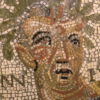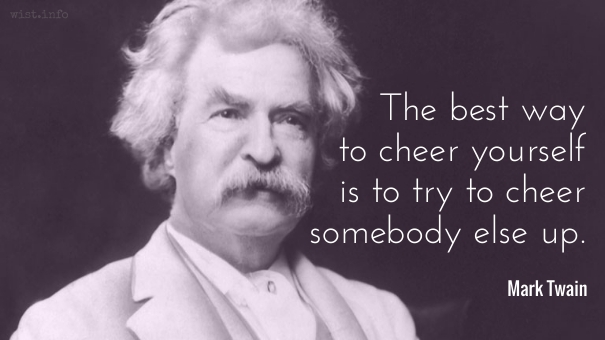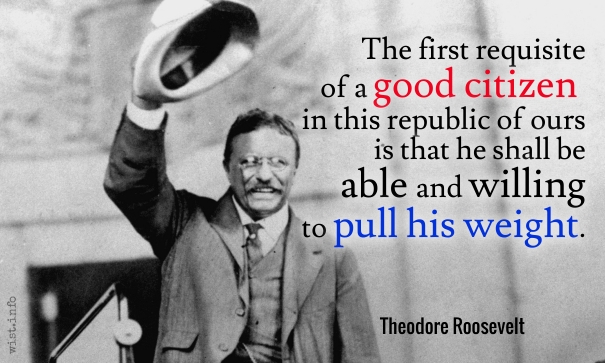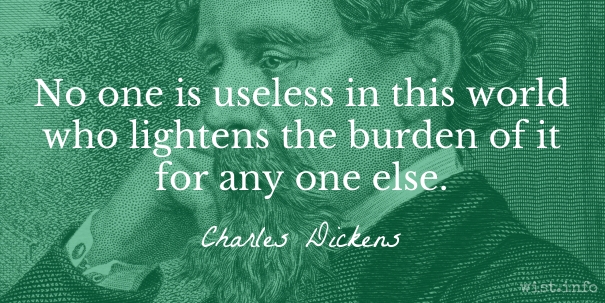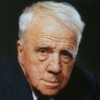Bear ye one another’s burdens, and so fulfil the law of Christ.
[Ἀλλήλων τὰ βάρη βαστάζετε καὶ οὕτως ἀναπληρώσετε τὸν νόμον τοῦ Χριστοῦ.]
The Bible (The New Testament) (AD 1st - 2nd C) Christian sacred scripture
Galatians 6: 2 [KJV (1611)]
(Source)
See Thomas à Kempis (c. 1420).
(Source (Greek)). Alternate translations:You should carry each other's troubles and fulfil the law of Christ.
[JB (1966)]Carry each other's burdens; that is how to keep the law of Christ.
[NJB (1985)]Help carry one another's burdens, and in this way you will obey the law of Christ.
[GNT (1992 ed.)]Carry each other’s burdens and so you will fulfill the law of Christ.
[CEB (2011)]Bear one another’s burdens, and in this way you will fulfill the law of Christ.
[NRSV (2021 ed.)]
Quotations about:
help
Note not all quotations have been tagged, so Search may find additional quotes on this topic.
DEAR MISS MANNERS: When does a gentleman offer his arm to a lady as they are walking down the street together?
GENTLE READER: Strictly speaking, only when he can be practical assistance to her. That is, when the way is steep, dark, crowded, or puddle-y. However, it is rather a cozy juxtaposition, less compromising than walking hand in hand, and rather enjoyable for people who are fond of each other, so Miss Manners allows some leeway in interpreting what is of practical assistance. One wouldn’t want a lady to feel unloved walking down the street, any more than one would want her to fall of the curb.
The smallest effort is not lost,
Each wavelet on the ocean tost
Aids in the ebb-tide or the flow;
Each rain-drop makes some floweret blow;
Each struggle lessens human woe.Charles Mackay (1814-1889) Scottish poet, journalist, song writer
Poem (1856?), “The Old and the New,” st. 45, Ballads and Lyrical Poems
(Source)
If I would help the weak, I must be fed
In wit and purpose, pour away despair
And rinse the cup, eat happiness like bread.Edna St. Vincent Millay (1892-1950) American poet
Poem (1940), “I must not die of pity; I must live,” ll. 12-14, Make Bright the Arrows, ch. 5 “Sonnets,” No. 6
(Source)
CHORUS: It is right for women to stand by a woman’s cause.
[ΧΟΡΟΣ: γυναῖκα γὰρ δὴ συμπονεῖν γυναικὶ χρή.]
Euripides (485?-406? BC) Greek tragic dramatist
Helen [Ἑλένη], l. 329 (412 BC) [tr. Lattimore (1956)]
(Source)
Encouraging Helen to learn more about her husband's fate from the prophetess Theonoë, and offering to go with her.(Source (Greek)). Other translations:Thus a woman ought
With friendly aid to share a woman's cares.
[tr. Potter (1783), l. 370ff]For 'tis a woman's duty to exert
Her utmost efforts in a woman's cause.
[tr. Wodhull (1809)]For it is meet that a woman should with a woman labor.
[tr. Buckley (1850)]For, truly, women ought to help each other.
[tr. Coleridge (1891)]That woman woman's burden share, is meet.
[tr. Way (Loeb) (1912)]Women in woman's need must sympathise.
[tr. Sheppard (1925)]For women ought to give each other helping hands.
[tr. Warner (1951)]Women ought to help each other.
[tr. Vellacott (1954)]We are all women;
and it is right for us to shoulder one another's burdens.
[tr. Meagher (1986)]Women should support one another.
[tr. Davie (2002)]For 'tis a woman's bounden duty to share a sister's trouble.
[tr. Athenian Society (2006)]Women should stick together, and help each other out.
[tr. A. Wilson (2007)]We women must help one another.
[tr. Theodoridis (2011)]For woman must with woman toil.
[tr. Ambrose et al. (2018)]For, truly, women ought to help each other.
[tr. Coleridge / Helen Heroization Team]
Another not uncommon victim of persecution mania is a certain type of philanthropist, who is always doing good to people against their will, and is amazed and horrified that they display no gratitude. Our motives in doing good are seldom as pure as we imagine them to be. Love of power is insidious; it has many disguises, and is often the source of the pleasure we derive from doing what we believe to be good to other people.
Assist the afflicted with something real, if thou canst: As for Tears they are but Water, what good can they do?
Thomas Fuller (1654-1734) English physician, preacher, aphorist, writer
Introductio ad Prudentiam, Vol. 2, # 2023 (1727)
(Source)
Cadfael buckled his saddlebags before him, and mounted a little stiffly, but with plain pleasure. Considerately, Hugh refrained from offering help. Sixty-five is an age deserving of respect and reverence from the young, but those who have reached it do not always like to be reminded.
Ellis Peters (1913-1995) English writer, translator [pseud. of Edith Mary Pargeter, who also wrote under the names John Redfern, Jolyon Carr, Peter Benedict]
Brother Cadfael’s Penance, ch. 2 (1994)
(Source)
If thou wilt be cured of thy Ignorance, confess it.
Thomas Fuller (1654-1734) English physician, preacher, aphorist, writer
Introductio ad Prudentiam, Vol. 1, # 84 (1725)
(Source)
What an art it is, to give, even to our nearest friends! and what a test of manners to receive! How, upon either side, we smuggle away the obligation, blushing for each other; how bluff and dull we make the giver; how hasty, how falsely cheerful, the receiver! and yet an act of such difficulty and distress between near friends, it is supposed we can perform to a total stranger and leave the man transfixed with grateful emotions. The last thing you can do to a man is to burthen him with an obligation, and it is what we propose to begin with! But let us not be deceived: unless he is totally degraded to his trade, anger jars in his inside, and he grates his teeth at our gratuity.
We should wipe two words from our vocabulary: gratitude and charity. In real life, help is given out of friendship, or it is not valued; it is received from the hand of friendship, or it is resented.Robert Louis Stevenson (1850-1894) Scottish essayist, novelist, poet
Essay (1888-03), “Beggars,” sec. 4 Scribner’s Magazine, Vol. 3, No. 3
(Source)
Collected in Across the Plains, ch. 9 (1892).
We were born for cooperation, like feet, like hands, like eyelids, like the rows of upper and lower teeth. So to work against each other is contrary to nature; and resentment and rejection count as working against someone.
[γεγόναμεν γὰρ πρὸς συνεργίαν ὡς πόδες, ὡς χεῖρες, ὡς βλέφαρα, ὡς οἱ στοῖχοι τῶν ἄνω καὶ κάτω ὀδόντων. τὸ οὖν ἀντιπράσσειν ἀλλήλοις παρὰ φύσιν: ἀντιπρακτικὸν δὲ τὸ ἀγανακτεῖν καὶ ἀποστρέφεσθαι.]
Marcus Aurelius (AD 121-180) Roman emperor (161-180), Stoic philosopher
Meditations [To Himself; Τὰ εἰς ἑαυτόν], Book 2, ch. 1 (2.1) [tr. Gill (2013)]
(Source)
(Source (Greek)). Alternate translations:For we are all born to be fellow-workers, as the feet, the hands, and the eyelids; as the rows of the upper and under teeth: for such therefore to be in opposition, is against nature; and what is it to chafe at, and to be averse from, but to be in opposition?
[tr. Casaubon (1634), 1.15]For we are all made for mutual Assistance, no less than the Parts of the Body are for the Service of the whole; From whence it follows that Clashing and Opposition is perfectly Unnatural: Now such an unfriendly Disposition is imply'd in Resentment and Aversion.
[tr. Collier (1701)]We were formed by nature for mutual assistance, as the two feet, the hands, the eye¬ lids, the upper and lower rows of teeth. Opposition to each other is contrary to nature: All anger and aversion is an opposition.
[tr. Hutcheson/Moor (1742)]For we are all born for our mutual assistance; as the hands and feet, and every part of the human body, are for the service of the whole; to thwart and injure each other, therefore, is contrary to nature. Now injuries and hostilities are generally the consequence of hatred and resentment.
[tr. Graves (1792)]For we are made for co-operation, like feet, like hands, like eyelids, like the rows of the upper and lower teeth. To act against one another, then, is contrary to nature; and it is acting against one another to be vexed and to turn away.
[tr. Long (1862)]For we are all made for mutual assistance, as the feet, the hands, and the eyelids, as the rows of the upper and under teeth, from whence it follows that clashing and opposition is perfectly unnatural. Now such an unfriendly disposition is implied in resentment and aversion.
[tr. Collier/Zimmern (1887)]For we are made for co-operation, like the feet, the hands, the eyelids, the upper and the lower rows of teech. To thwart one another is contrary to nature; and one form of thwarting is resentment and estrangement.
[tr. Rendall (1898)]For we are made by nature for mutual assistance, like the feet, the hands, the eyelids, the upper and lower rows of teeth. It is against nature for men to oppose each other; and what else is anger and aversion?
[tr. Hutcheson/Chrystal (1902)]For we have come into being for co-operation, as have the feet, the hands, the eyelids, the rows of upper and lower teeth. Therefore to thwart one another is against Nature; and we do thwart one another by shewing resentment and aversion.
[tr. Haines (Loeb) (1916)]For we have come into the world to work together, like feet, like hands, like eyelids, like the rows of upper and lower teeth. To work against one another therefore is to oppose Nature, and to be vexed with another or to turn away from him is to tend to antagonism.
[tr. Farquharson (1944)]For he and I were born to work together, like a man’s two hands, feet, or eyelids, or like the upper and lower rows of his teeth. To obstruct each other is against Nature’s law -- and what is irritation or aversion but a form of obstruction?
[tr. Staniforth (1964)]For we have come into being to work together, like feet, hands, or eyelids, or the two rows of teeth in our upper and lower jaws. To work against one another is therefore contrary to nature; and to be angry with another and turn away form him is surely to work against him.
[tr. Hard (1997 ed.)]We were born to work together like feet, hands, and eyes, like the two rows of teeth, upper and lower. To obstruct each other is unnatural. To feel anger at someone, to turn your back on him: these are obstructions.
[tr. Hays (2003)]We were born for cooperation, like feet, like hands, like eyelids, like the rows of upper and lower teeth. So to work in opposition to one another is against nature: and anger or rejection is opposition.
[tr. Hammond (2006)]For we have been made for cooperation, just like the feet, the hands, the eyelids, and the upper and lower teeth. To hinder one another, then, is contrary to Nature, and this is exactly what happens when we are angry and turn away from each other.
[tr. Needleman/Piazza (2008)]For we have come into being to work together, like feet, hands, eyelids, or the two rows of teeth in our upper and lower jaws. To work against one another is therefore contrary to nature; and to be angry with another person and turn away from him is surely to work against him.
[tr. Hard (2011 ed.)]For both they and I need each other. To act against them would be to act against myself. And to become angry and turn away from them is also to act against them.
[tr. McNeill (2019)]
Doing all we can to promote our friend’s happiness is better than to continually drink to his prosperity.
Minna Antrim (1861-1950) American epigrammatist, writer
Naked Truth and Veiled Allusions (1902)
(Source)
God helps them that help themselves.
Benjamin Franklin (1706-1790) American statesman, scientist, philosopher, aphorist
Poor Richard (1736 ed.)
(Source)
Sometimes misattributed as a Biblical proverb. A modern variant is "God helps those that help themselves."
Benevolence is a natural instinct of the human mind. When A sees B in grievous distress, his conscience always urges him to entreat C to help him.
Sydney Smith (1771-1845) English clergyman, essayist, wit
(Attributed)
(Source)
In Hesketh Pearson, The Smith of Smiths, ch. 10 (1934).
And remember, we all stumble, every one of us. That’s why it’s a comfort to go hand in hand.
Emily Kimbrough (1899-1989) American author and journalist
The Innocents from Indiana, ch. 17 (1950)
(Source)
At the very end of the book, a note from the protagonist's mother, about the protagonist having failed the entrance examination to Bryn Mawr.
When you live with a joyful sense of purpose, when you infuse your life with a greater purpose beyond your individual self, every aspect of your karma can become a brilliant facet of your mission. You can transform sorrow and adversity of any sort into joy, stability, health, and prosperity. By changing poison into medicine and accomplishing your inner revolution, you can use every experience of karma to encourage others who suffer from the same problems that you overcame.
You can become an ambassador of hope, an essential and radiant treasure of humanity, in which you recognize that all who have ever lived are members of your extended family.
As you continue to spread light in this way, actively doing good in the world, that energy will come back to you in abundant positivity. When you refuse to perpetuate any bad that has been done to you, you can free yourself from the chains of negativity.
Tina Turner (1939-2023) American singer, songwriter, actress [b. Anna Mae Bullock]
Happiness Becomes You, ch. 8 (2020)
(Source)
Princes like to be helped, but not surpassed. When you counsel someone, you should appear to be reminding him of something he had forgotten, not of the light he was unable to see.
[Gustan de ser ayudados los príncipes, pero no excedidos, y que el aviso haga antes viso de recuerdo de lo que olvidaba que de luz de lo que no alcanzó.]
Baltasar Gracián y Morales (1601-1658) Spanish Jesuit priest, writer, philosopher
The Art of Worldly Wisdom [Oráculo Manual y Arte de Prudencia], § 7 (1647) [tr. Maurer (1992)]
(Source)
(Source (Spanish)). Alternate translations:Princes are willing to be assisted, but not surpassed. Those who advise them ought to speak as if they put them in mind of what they forgot, and not as teaching them what they knew not.
[Flesher ed. (1685)]They [princes] will allow a man to help them but not to surpass them, and will have any advice tendered them appear like a recollection of something they have forgotten rather than as a guide to something they cannot find.
[tr. Jacobs (1892)]They [kings] may abide being helped, but not surpassed, wherefore let advice given them appear more a jog to what they forgot, than a light to what they could not find.
[tr. Fischer (1937)]
Do you see the consequences of the way we have chosen to think about success? Because we so profoundly personalize success, we miss opportunities to lift others onto the top rung. […] We are too much in awe of those who succeed and far too dismissive of those who fail. And most of all, we become much too passive. We overlook just how large a role we all play — and by “we” I mean society — in determining who makes it and who doesn’t.
Malcolm Gladwell (b. 1963) Anglo-Canadian journalist, author, public speaker
Outliers: The Story of Success, Part 1, ch. 1 (2008)
(Source)
We never get anywhere in this world without the forces of history and individual persons in the background helping us to get there.
Martin Luther King, Jr. (1929-1968) American clergyman, civil rights leader, social activist, preacher
“Conquering Self-Centeredness,” sermon, Dexter Ave. Baptist Church, Montgomery, Ala. (11 Aug 1957)
(Source)
But if my forces
are not enough, I am hardly the one to relent,
I’ll plead for the help I need, wherever it may be —
If I cannot sway the heavens, I’ll wake the powers of hell![Quod si mea numina non sunt
magna satis, dubitem haud equidem implorare quod usquam est:
flectere si nequeo superos, Acheronta movebo.]Virgil (70-19 BC) Roman poet [b. Publius Vergilius Maro; also Vergil]
The Aeneid [Ænē̆is], Book 7, l. 310ff (7.310-312) [Juno] (29-19 BC) [tr. Fagles (2006)]
(Source)
(Source (Latin)). Alternate translations:But if my own power not sufficient be,
Undaunted, aydes I'le seek where ere they dwell;
Will heaven not grant my sute, I'le raise up hell.
[tr. Ogilby (1649)]If native pow'r prevail not, shall I doubt
To seek for needful succor from without?
If Jove and Heav'n my just desires deny,
Hell shall the pow'r of Heav'n and Jove supply.
[tr. Dryden (1697)]But if my own divinity is not powerful enough, surely I need not hesitate to implore whatever deity any where subsists: if I cannot move the powers above, I will solicit those of hell.
[tr. Davidson/Buckley (1854)]If strength like mine be yet too weak,
I care not whose the aid I seek:
What choice 'twixt under and above?
If Heaven be firm, the shades shall move.
[tr. Conington (1866)]But if not enough my power,
I shall not pause to ask what aid I may.
And if I cannot bend the gods above,
Then Acheron I'll move.
[tr. Cranch (1872), l. 388ff]If my deity is not great enough, I will not assuredly falter to seek succour where it may be; if the powers of heaven are inflexible, I will stir up Acheron.
[tr. Mackail (1885)]But if of no avail
My godhead be, I will not spare to pray what is of might,
Since Heaven I move not, needs must I let loose the Nether Night.
[tr. Morris (1900), l. 310ff]If too weak
Myself, some other godhead will I try,
And Hell shall hear, if Heaven its aid deny.
[tr. Taylor (1907), st. 42, l. 372ff]If so weak
my own prerogative of godhead be,
let me seek strength in war, come whence it will!
If Heaven I may not move, on Hell I call.
[tr. Williams (1910)]But if my powers be not strong enough, surely I need not be slow to seek succour wherever it may be; if Heaven I can not bend, then Hell I will arouse!
[tr. Fairclough (1918)]So, if my power
Falls short of greatness, I must try another’s,
Seek aid where I can find it. If I cannot
Bend Heaven, I can raise Hell.
[tr. Humphries (1951)]Well, if my powers are not great enough,
I shall not hesitate -- that's sure -- to ask help wherever
Help may be found. If the gods above are no use to me, then I'll
Move all hell.
[tr. Day-Lewis (1952)]If my power
is not enough, I shall not hesitate
to plead for more, from anywhere; if I
cannot bend High Ones, then I shall move hell.
[tr. Mandelbaum (1971), l. 410ff]Well, if my powers fall short,
I need not falter over asking help
Wherever help may lie. If I can sway
No heavenly hearts I'll rouse the world below.
[tr. Fitzgerald (1981), l. 423ff]But if my own resources as a goddess are not enough, I am not the one to hesitate. I shall appeal to whatever powers there are. If I cannot prevail upon the gods above, I shall move hell.
[tr. West (1990)]But if my divine strength is not
enough, I won’t hesitate to seek help wherever it might be:
if I cannot sway the gods, I’ll stir the Acheron.
[tr. Kline (2002)]But if my powers
Are not great enough, why should I hesitate
To seek help from any source whatever?
If I cannot sway Heaven, I will awaken Hell!
[tr. Lombardo (2005)]If I cannot bend the gods, I will move Acheron.
[tr. @sentantiq (2012)]If my powers aren't enough, why not stoop to begging anyone? If I can't move the gods above, then I'll move Acheron.
[tr. Bartsch (2021)]If I cannot bend Heaven, I shall move Hell.
[Bartlett's]
A tinker’s debt is always paid:
Once for any simple trade.
Twice for freely given aid.
Thrice for any insult made.
“Some people say we shouldn’t give alms to the poor, Shirley.”
“They are great fools for their pains. For those who are not hungry, it is easy to palaver about the degradation of charity, and so on; but they forget the brevity of life, as well as its bitterness. We have none of us long to live: let us help each other through seasons of want and woe, as well as we can, without heeding in the least the scruples of vain philosophy.”
Charlotte Brontë (1816-1855) British novelist [pseud. Currer Bell]
Shirley, ch. 14 [Lina and Shirley] (1849)
(Source)
Alas! in naught may one trust the gods against their will!
[Heu nihil invitis fas quemquam fidere divis!]
Virgil (70-19 BC) Roman poet [b. Publius Vergilius Maro; also Vergil]
The Aeneid [Ænē̆is], Book 2, l. 402 (2.402) [Aeneas] (29-19 BC) [tr. Fairclough (1916)]
(Source)
(Source (Latin)). Alternate translations:Ah, who may hope if by the Gods deni'd!
[tr. Ogilby (1649)]But, ah! what use of valour can be made,
When heav'n's propitious pow'rs refuse their aid!
[tr. Dryden (1697)]Alas! it is right for one to trust to nothing when the gods are adverse.
[tr. Anthon (1843)]Alas! on nothing ought man to presume, while the gods are against him!
[tr. Davidson/Buckley (1854)]Alas! a mortal may not lean
On Heaven, when Heaven averts its mien.
[tr. Conington (1866)]Alas, one ought
To trust in nothing, when the gods oppose.
[tr. Cranch (1872), ll. 549-550]Alas that none may trust at all to estranged gods!
[tr. Mackail (1885)]Alas! what skills it man to trust in Gods compelled to good?
[tr. Morris (1900)]Ah! vain to boast, if Heaven refuse to aid!
[tr. Taylor (1907)]But woe is me! If gods their help withhold,
't is impious to be brave.
[tr. Williams (1910)]Alas! it is not well for anyone to be confident when the gods are adverse.
[Source (1922)]It is not for men to trust unwilling gods.
[tr. Humphries (1951)]Ah, well, there's no trusting the gods for anything, once they're against you!
[tr. Day Lewis (1952)]But oh, it is not right for anyone
to trust reluctant gods!
[tr. Mandelbaum (1971), ll. 540-541]When gods are contrary
They stand by no one.
[tr. Fitzgerald (1981), ll. 532-533]But no man can trust in gods who are opposed to him.
[tr. West (1990)]Ah, put no faith in anything the will of the gods opposes!
[tr. Kline (2008)]Never rely on the gods for anything
Against their will.
[tr. Lombardo (2005), ll. 466-467]But, oh
how wrong to rely on gods dead set against you!
[tr. Fagles (2006), ll. 501-502]How wrong it is to trust the gods against their will!
[tr. Bartsch (2021)]
I noted that it is sometimes hard to tell whether you are being killed or saved by the hands that turn your life upside down.
Barbara Brown Taylor (b. 1951) American minister, academic, author
Learning to Walk in the Dark, ch. 3 (2014)
(Source)
I think, for what my young opinion’s worth,
That good as it is to have infallible wisdom,
Since this is rarely found, the next best thing
Is to be willing to listen to wise advice.[γνώμη γὰρ εἴ τις κἀπ᾽ ἐμοῦ νεωτέρου
πρόσεστι, φήμ᾽ ἔγωγε πρεσβεύειν πολὺ
φῦναι τὸν ἄνδρα πάντ᾽ ἐπιστήμης πλέων:
εἰ δ᾽ οὖν, φιλεῖ γὰρ τοῦτο μὴ ταύτῃ ῥέπειν,
καὶ τῶν λεγόντων εὖ καλὸν τὸ μανθάνειν.]Sophocles (496-406 BC) Greek tragic playwright
Antigone, l. 719ff [Haemon] (441 BC) [tr. Watling (1947)]
(Source)
Original Greek. Alternate translations:For, if grounded maxims
May find their utterance e'en in me your son,
I dare be bold to say 'tis better far
That understanding should be born in man:
But if this may not be: -- and, to say sooth,
The common scale inclines not thus, -- 'tis well
To learn from any one who reasons soundly.
[tr. Donaldson (1848)]For, if one young in years may claim some sense,
I'll say 'tis best of all to be endowed
With absolute wisdom; but, if that's denied,
(And nature takes not readily that ply)
Next wise is he who lists to sage advice.
[tr. Campbell (1873)]If any judgement hath informed my youth,
I grant it noblest to be always wise,
But, -- for omniscience is denied to man --
Tis good to hearken to admonishment.
[tr. Storr (1859)]For if even from me, a younger man, a worthy thought may be supplied, by far the best thing, I believe, would be for men to be all-wise by nature. Otherwise -- since most often it does not turn out that way -- it is good to learn in addition from those who advise you well.
[tr. Jebb (1891)]For if I, a younger man, may offer my thought, it were far best, I ween, that men should be all-wise by nature; but, otherwise -- and oft the scale inclines not so -- 'tis good also to learn from those who speak aright.
[tr. Jebb (1917)]I know I am young; but please let me say this: The ideal condition
Would be, I admit, that men should be right by instinct;
But since we are all too likely to go astray,
The reasonable thing is to learn from those who can teach.
[tr. Fitts/Fitzgerald (1939), l. 578ff]Young as I am, if I may give advice,
I'd say it would be best if men were born
perfect in wisdom, but failing this
(which often fails) it can be no dishonor
to learn from others when they speak good sense.
[tr. Wyckoff (1954)]If one who is still young can speak with sense,
Then I would say that he does best who has
Most understanding; second best, the man
Who profits from the wisdom of another.
[tr. Kitto (1962)]I'm young, I know, but let me offer this:
it would be best by far, I admit,
if a man were born infallible, right by nature.
If not -- and things don't often go that way --
it's best to learn from those with good advice.
[tr. Fagles (1982), l. 805ff]For if an opinion comes up from me, a younger person,
I say it is by far best that a man be born filled with
wisdom. If he is not, for the scale does not usually so incline,
to learn from those speaking competently is a noble thing.
[tr. Tyrell/Bennett (2002)]I’m younger, I know but I still might be able to judge what’s right and I say that it’s a good thing for a man to be born with all possible wisdom but still -- because it’s not such a common thing -- to be able to learn from others.
[tr. Theodoridis (2004)]For if I, as a younger man, may state
my views, I’d say it would be for the best
if men by nature understood all things --
if not, and that is usually the case,
when men speak well, it good to learn from them.
[tr. Johnston (2005)]Even though I'm young, a good idea might come from me: It would be best by far that man be born full of all the knowledge there is, but, if it usually happens not to turn out that way, to learn from those who speak well is a good substitute.
[tr. Thomas (2005)]
DEXTER: You know, before I got married, Emily used to come by sometimes and help me clean out my apartment. Well, I asked her, “How come you’re so eager to help clean up my place when your place is just as bad?” She said, “Because cleaning up your place helps me to forget what a mess I’ve made of mine, and — when I sweep my floor, all I’ve done is sweep my floor. But, when I help you clean up your place, I am helping you.”
For when the water is up to your neck you must be truly stubborn not to cry for help.
[Che chi ne l’acqua sta fin’alla gola
Ben’e ostinato se merce non grida.]Ludovico Ariosto (1474-1533) Italian poet
Orlando Furioso, Canto 1, st. 50, l. 353 (1532) [tr. Waldman]
Alt. trans.:
- "For who, when circling waters round him spread / And menace present death, impores not aid?" [tr. Hoole (1807)]
- "For the poor drowning caitiff, who, chin-deep, / Implores not help, is obstinate indeed." [tr. Rose (1831)]
- "The drowning man who waits to be exhorted / To cry for help must be a man of pride!" [tr. Reynolds (2006)]
When the lambs is lost in the mountain, he said. They is cry. Sometime come the mother. Sometime the wolf.
Cormac McCarthy (1933-2023) American novelist, playwright, screenwriter
Blood Meridian, ch. 5 (1985)
(Source)
Who kindly sets a wand’rer on his way
Does e’en as if he lit another’s lamp by his:
No less shines his, when he his friend’s hath lit.[Homó, qui erranti cómiter monstrát viam,
Quasi lúmen de suo lúmine accendát, facit.
Nihiló minus ipsi lúcet, cum illi accénderit.]Ennius (239-169 BC) Roman poet, writer [Quintus Ennius]
Telephus, frag 412-414 [tr. Miller (1913)]
(Source)
The fragment comes to us from Cicero, De Officiis [On Duties; On Moral Duty; The Offices], Book 1, ch. 16 / sec. 51 (44 BC). Original Latin. Alt. trans.:He that directs the wandering traveller,
Doth, as it were, light another's torch by his own;
Which gives him ne'er the less of light, for that
It gave another.
[tr. Cockman (1699)]The man who kindly points out the way to the wandering traveller, gives light to the lamp of another, without diminishing by the communication the light of his own.
[tr. McCartney (1798)]He who kindly shows the bewildered traveller the right road, does as it were light his lamp by his own; which affords none the less light to himself after it has lighted the other.
[tr. Edmonds (1865)]Who kindly shows a wanderer his way,
Lights, as it were, a torch from his own torch, --
In kindling others' light, no less he shines.
[tr. Peabody (1883)]The man who kindly points the way top a wanderer, does as though he kindles a light from the light that is his; it shines none the less for himself when he has kindled it for his fellow.
["trib Teleph. R suae lumine accendit facis Hartman, Mnemoe., XXI, 382 fortass recte"]
Come heed me, my brothers, come heed, one and all
Don’t brag about standing or you’ll surely fall
You’re shining your light and shine it you should
But you’re so heavenly minded, you’re no earthly goodIf you’re holding heaven, then spread it around
There’s hungry hands reaching up here from the ground
Move over and share the high ground where you stood
So heavenly minded, you’re no earthly goodJohn R. "Johnny" Cash (1932-2003) American singer-songwriter, guitarist, actor, author
“So Heavenly Minded, You’re No Earthly Good”
(Source)
To Herbert Westbrook, without whose never-failing advice, help, and encouragement, this book would have been finished in half the time.
P. G. Wodehouse (1881-1975) Anglo-American humorist, playwright and lyricist [Pelham Grenville Wodehouse]
A Gentleman of Leisure, Dedication (1910)
(Source)
When all is said and all is done,
When all is lost or all is won —
In spite of musty theory,
Of purblind faith and vain conceit,
Of barren creed and sophistry:
In spite of all — success, defeat,
The Judge accords to worst and best,
Impartially, this final test:
What hast thou done with brawn and brain,
To help the world to lose or gain
An onward step? Canst reckon one
Unselfish, brave or noble deed,
That thou — nor counting cost! Hast done
To help a brother’s crying need?
Not what professed nor what believed —
But what good thing hast thou achieved?
Now Jesus himself saw the power that competition holds over men. He did not ignore it. Yet he does something with the conception of competition that hadn’t been done before. He takes the conception which has been used for lower purposes and rescues it from many of its dangers, by suggesting a higher method of its use. This is how he applied the term to his disciples. He saw them in danger of using it for low purposes. They wanted to compete for reputation and position — “which of them should be accounted greatest?” Jesus says so, if you must use the power of competition, if you must compete with on another, make it as noble as you can by using it on noble things. Use it for a fine, unselfish thing. “He that is greatest among you shall serve.” Use it for human good. Who shall be the most useful. Compete with one another in humility. See which can be the truest servant. It seems that Christ says, “Use it, but use it for higher and holier purposes. Use it not to surpass one another in esteem, but use it to increase the amount of usefulness and brother-help.” Such conceptions of competition lead to the surprising and ennobling position that there can be competition without hate and jealousy. Behold! You can struggle to beat and yet rejoice to be beaten.
Martin Luther King, Jr. (1929-1968) American clergyman, civil rights leader, social activist, preacher
“Cooperative Competition / Noble Competition,” sermon outline
(Source)
The best way to cheer yourself is to try to cheer somebody else up.
Mark Twain (1835-1910) American writer [pseud. of Samuel Clemens]
Note (1896-11-26), Mark Twain’s Notebook, ch. 27 “England” (1935) [ed. Albert Bigelow Paine]
(Source)
Written while in Guilford, England, shortly after the death of his daughter Susy in America.
Often given as "The best way to cheer yourself up is to try to cheer somebody else up." More discussion here.
If you asked twenty good men today what they thought the highest of the virtues, nineteen of them would reply, Unselfishness. But if you asked almost any of the great Christians of old he would have replied, Love. You see what has happened? A negative term has been substituted for a positive, and this is of more than philological importance. The negative ideal of Unselfishness carries with it the suggestion not primarily of securing good things for others, but of going without them ourselves, as if our abstinence and not their happiness was the important point. I do not think this is the Christian virtue of Love.
The first requisite of a good citizen in this republic of ours is that he shall be able and willing to pull his weight; that he shall not be a mere passenger, but shall do his share in the work that each generation of us finds ready to hand; and, furthermore, that in doing his work he shall show, not only the capacity for sturdy self-help, but also self-respecting regard for the rights of others.
Theodore Roosevelt (1858–1919) American politician, statesman, conservationist, writer, US President (1901–1909)
Speech (1902-11-11), State Chamber of Commerce Banquet, New York City
(Source)
This first part of this passage was quoted by Ronald Reagan at a fundraising dinner for Sen. Mack Mattingly in Atlanta (1985-06-05), discussing reform measures to close up tax loopholes.
It’s okay if you don’t want to feed the hungry, or heal the sick, or house the homeless. Just don’t say you’re doing it for their own good. Don’t say you’d like to help people, but your hands are tied, because if you did it would cause a “culture of dependency,” or “go against the Bible,” or, worst of all, “rob them of their freedom” to be sick and hungry. Just admit you’re selfish, and based on how little your beliefs mirror the actual teachings of Jesus you might as well be worshiping Despicable Me.
When I think about all the money we spent on bombs and munitions, and our failures in Viet Nam, Iraq, Afghanistan and other places around the world … Instead of advancing our agenda using force, we should have instead built schools and hospitals in these countries, improving the lives of their children. By now, those children would have grown into positions of influence, and they would be grateful to us instead of hating us.
George Shultz (b. 1920) American economist, statesman, and businessman
(Attributed)
(Source)
Quoted in In Daniel Levitin, The Organized Mind (2014).
Though we see the same world, we see it through different eyes. Any help we can give you must be different from that you can give yourselves, and perhaps the value of that help may lie in the fact of that difference.
It is all right to tell a man to lift himself up by his own bootstraps, but it is a cruel jest to say to a bootless man that he ought to lift himself up by his own bootstraps.
Fortune favors the bold.
[Audentis Fortuna iuvat]
Virgil (70-19 BC) Roman poet [b. Publius Vergilius Maro; also Vergil]
The Aeneid [Ænē̆is], Book 10, l. 284 (10.284) [Turnus] (29-19 BC) [tr. West (1990)]
(Source)
The Rutulian prince exhorting his men to meet Aeneas' Trojans on the beach as they land. Not a sentiment invented by Virgil. See also Terence.
(Source (Latin)). Alternate translations:Fortune assists the bold.
[tr. Ogilby (1649)]Fortune befriends the bold.
[tr. Dryden (1697)]Fortune assists the daring.
[tr. Davidson/Buckley (1854)]Fair fortune aids the bold.
[tr. Conington (1866)]Fortune assists the bold.
[tr. Cranch (1872), l. 380]Fortune aids daring.
[tr. Mackail (1885)]For Fortune helpeth them that dare.
[tr. Morris (1900)]Fair Fortune aids the bold.
[tr. Taylor (1907), st. 37, l. 342]Fortune will help the brave.
[tr. Williams (1910)]Fortune aids the daring.
[tr. Fairclough (1918)]And luck helps men who dare.
[tr. Humphries (1951)]Fortune always fights for the bold.
[tr. Day-Lewis (1952)]For fortune
helps those who dare.
[tr. Mandelbaum (1971), ll. 395-96]Fortune
favors men who dare!
[tr. Fitzgerald (1981), ll. 392-93]Fortune favours the brave.
[tr. Kline (2002)]Fortune speeds the bold!
[tr. Fagles (2006), l. 341]
All people should be loved equally. But you cannot do good to all people equally, so you should take particular thought for those who by the chance of place or time or anything else are, as if by lot, in particularly close contact with you.
[Omnes autem aeque diligendi sunt. Sed cum omnibus prodesse non possis, his potissimum consulendum est, qui pro locorum et temporum vel quarumlibet rerum opportunitatibus constrictius tibi quasi quadam sorte iunguntur.]
Augustine of Hippo (354-430) Christian church father, philosopher, saint [b. Aurelius Augustinus]
On Christian Doctrine [De Doctrina Christiana], Book 1, ch. 28 / § 29 (1.28.29) (AD 397) [tr. Green (1995), § 61]
(Source)
(Source (Latin)). Alternate translations:Further, all men are to be loved equally. But since you cannot do good to all, you are to pay special regard to those who, by the accidents of time, or place, or circumstance, are brought into closer connection with you.
[tr. Shaw (1858)]All other men are to be loved equally; but since you cannot be of assistance to everyone, those especially are to be cared for who are most closely bound to you by place, time, or opportunity, as if by chance.
[tr. Robertson (1958)]
Many hands make light warke.
John Heywood (1497?-1580?) English playwright and epigrammist
Proverbes, Part 2, ch. 5 (1546)
(Source)
“It is impossible to help all,” says the miser, and — helps none.
[Man kann nicht allen helfen! sagt der Engherzige und — hilft Keinem.]
Marie von Ebner-Eschenbach (1830-1916) Austrian writer
Aphorisms [Aphorismen], No. 105 (1880) [tr. Wister (1883)]
(Source)
(Source (German)). Alternate translation:You can't be of help to everybody! say the narrow-minded, and help nobody.
[tr. Scrase/Mieder (1994)]
Helpe thy selfe, and God will helpe thee.
George Herbert (1593-1633) Welsh priest, orator, poet.
Jacula Prudentum, or Outlandish Proverbs, Sentences, &c. (compiler), # 537 (1640 ed.)
(Source)
For more discussion of this and other closely related quotations: God helps those who help themselves - Wikipedia
The gods help them that help themselves.
Aesop (620?-560? BC) Legendary Greek storyteller
Fables [Aesopica], “Hercules and the Wagoner” (6th C BC)
(Source)
Alternate translation: "Heaven only aided those who endeavoured to help themselves. It is in vain to expect our prayers to be heard, if we do not strive as well as pray." [tr. James (1848)]
If I can stop one heart from breaking
I shall not live in vain
If I can ease one life the aching
Or cool one pain
Or help one fainting robin
Unto his nest again
I shall not live in vain.
No act of kindness, no matter how small, is ever wasted.
Aesop (620?-560? BC) Legendary Greek storyteller
Fables [Aesopica], “The Lion and the Mouse” (6th C BC)
Alternate translation: "Kindness is seldom thrown away" [tr. James (1848)]
To those peoples in the huts and villages of half the globe struggling to break the bonds of mass misery, we pledge our best efforts to help them help themselves, for whatever period is required — not because the communists may be doing it, not because we seek their votes, but because it is right. If a free society cannot help the many who are poor, it cannot save the few who are rich.
John F. Kennedy (1917-1963) American politician, author, journalist, US President (1961–63)
Inaugural Address (20 Jan 1961)
(Source)
I long to accomplish a great and noble task; but it is my chief duty and joy to accomplish humble tasks as though they were great and noble. It is my service to think how I can best fulfil the demands that each day makes upon me, and to rejoice that others can do what I cannot. Green, the historian, tells us that the world is moved along, not only by the mighty shoves of its heroes, but also by the aggregate of the tiny pushes of each honest worker, and that thought alone suffices to guide me in this dark world and wide. I love the good that others do; for their activity is an assurance that whether I can help or not, the true and the good will stand sure.
Helen Keller (1880-1968) American author and lecturer
“Optimism,” Part 1 (1903)
(Source)
Often paraphrased as: "I long to accomplish a great and noble task, but it is my chief duty to accomplish humble tasks as though they were great and noble. The world is moved along, not only by the mighty shoves of its heroes, but also by the aggregate of the tiny pushes of each honest worker."



























